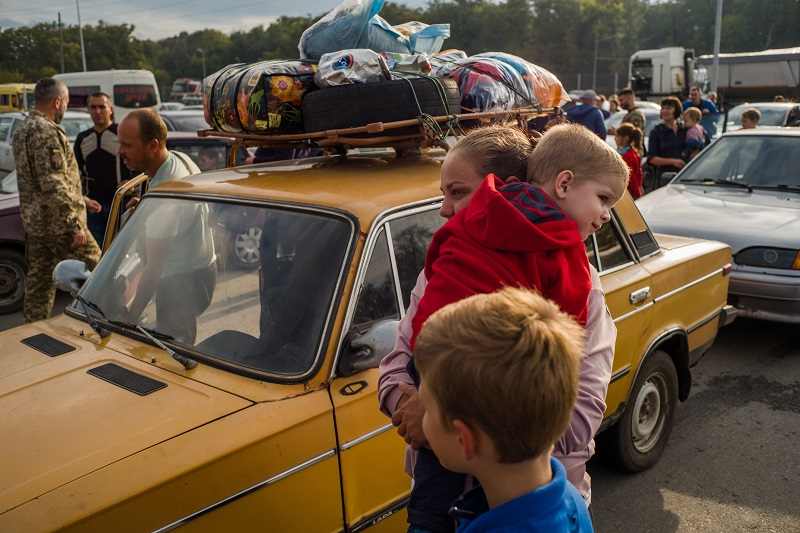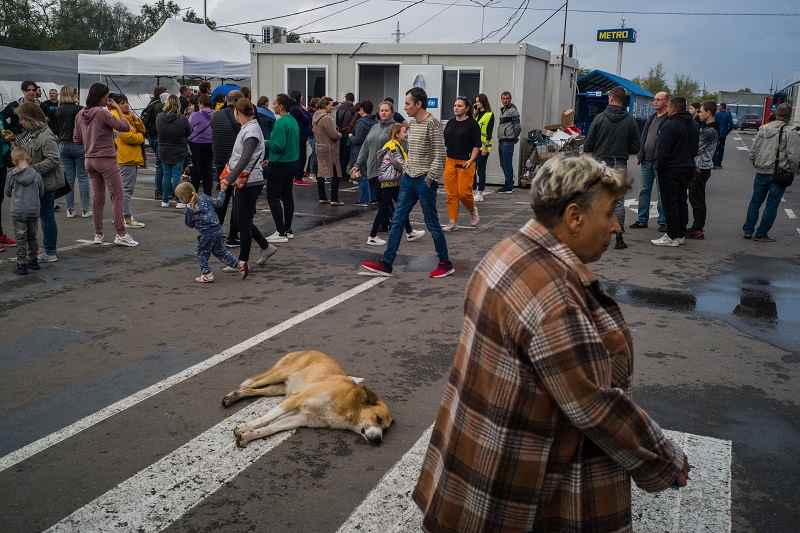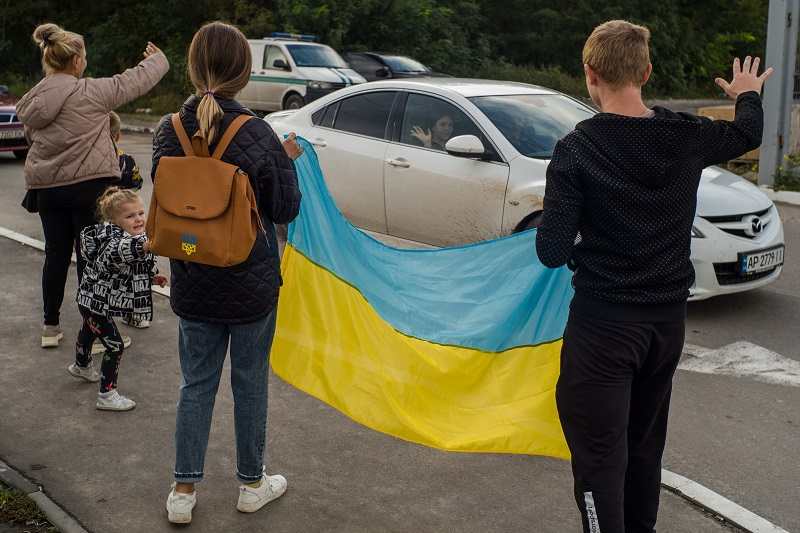In Zaporizhzhia, Russia controlled a referendum but not hearts or minds

A family from Berdyansk, which is occupied by Russian forces, spent two days on the road to get to the regional capital of Zaporizhzhia. They left their home in fear of Russia’s plan to annex much of southeastern Ukraine.
15:05 JST, September 30, 2022
ZAPORIZHZHIA, Ukraine – As Russian President Vladimir Putin prepared to declare his annexation of Zaporizhzhia and three other regions stretching across southeastern Ukraine, here in the regional capital, Ukrainian flags still fluttered above government buildings on Thursday, and Ukrainian officials still scurried through the halls.
Despite the Kremlin’s announcement that Putin would sign “accession treaties” at a ceremony in Moscow at 3 p.m. on Friday, the 10,000-square-mile province of Zaporizhzhia is neither under full Russian military nor under full administrative control of Russia’s proxies.
Ukraine still holds roughly a quarter of the region, including the capital city, located on the Dnieper River in the northwest corner. The regional administration is paying salaries, including in occupied cities.
On the slender road stretching out between the last Ukrainian position and the first Russian flags, doctors crossed the line to help in hospitals that Russian forces now oversee but barely restock.
And in the mismatch between Moscow’s fantastical rhetoric and the enduring reality of life in their sprawling province, many Ukrainians here said they saw Putin’s gambit as somewhere between surreal and absurd.
“It’s serious, but how can you take it seriously,” asked one woman who escaped Russian-controlled areas on Wednesday. “They’re just making up lines on a map.”
The woman asked that her name be withheld to protect relatives still living in the area she fled.
In a move that mirrored the stagecraft of Russia’s 2014 annexation of Crimea, Russian soldiers and compliant local administrations held staged plebiscites in Zaporizhzhia, Kherson, Donetsk and Luhansk, in a futile attempt to legitimize Russia’s still-tenuous military victories.
Proxy authorities said that 93 percent of citizens voted to become part of Russia. Escaping residents said those votes in some cases were cast at gunpoint.
Ukrainian forces halted the Russians’ advance through Zaporizhzhia in March, but not before Moscow had seized control of major cities including Mariupol, Melitopol, and Kherson, the urban hubs in an area that now forms Putin’s much-coveted “land bridge” to Crimea.
The Russians also seized an especially lucrative prize: Enerhodar, a town whose prewar population of 53,000 kept Europe’s largest nuclear power plant running.
Declaring all of these places to be Russia is one thing. Transforming them into Russia is another. Exactly how Putin intends to assert authority and control remains to be seen. Kyiv is vowing to fight until all of its land has been reclaimed, including Crimea. Western allies are promising weapons and money and more sanctions against Moscow.

A center for internally displaced people in Zaporizhzhia, Ukraine on Sept. 28.
Local officials, speaking from the relative safety of exile, have refused to accept the annexation.
“The referendums were a sham, they were theater,” said Dmytro Orlov, the exiled mayor of Enerhodar, interviewed from an old brick university building where the offices and corridors are now lined with aid boxes. “They change nothing for us, we’re still doing our work.”
As occurred in Crimea in 2014, Ukrainian authorities continue to pay the salaries of local government workers, doctors and teachers, according to officials who fled the provincial cities they once controlled. It is a sign of hope that the occupiers will be repelled.
The Ukrainians still send medical and other humanitarian supplies to help their citizens. When babies are born under Russian occupation, Ukrainian officials still produce identification papers for families that request them.
For Zaporizhzhia residents, the line between the last Russian checkpoint at Vasylivka and the first Ukrainian position is divided by several miles of rolling fields and a single road.
On Thursday, several doctors waited hours to lead a ragtag convoy of personal vehicles across the lines and toward their hometowns. Some were going to collect family members, others were there to do business. For the medics, the mission was life saving health care.
“People need us there,” said one of them, Vitaly, who like others interviewed along the road, asked that their last names be withheld for the security of family members and their work. “My specialty is heart problems, but I’ve worked on limbs, I’ve patched wounds. We need so many supplies, though. So many supplies that we just don’t have.”
In recent days, convoys of exhausted Ukrainian families have also escaped northward to Zaporizhzhia city, carrying tales of growing fear in towns and cities they left behind. For many, the referendums of the last few days were the final straw: with their land being grabbed, men young and old worried that they would be forced to join a fratricidal war and fight against their countrymen.
Before this war, the journeys would have taken mere hours. Now, they took days. Many people slept in their cars between checkpoints, navigating a grinding process of interrogations and security clearances to keep moving.
As the latest convoy cleared Russian territory Thursday and coursed toward Zaporizhzhia city, the faces peering out were suspended in raw emotion. Some people beamed. Others laughed. Tears streamed down cheeks. One teenage girl rolled down the window, letting the wind set loose her hair as a calm smile spread across her face.

Ukrainians welcome friends to the Zaporizhzhia center for internally displaced people on Sept. 28.
The yellow of the Ukrainian flag was glowing almost golden in the late afternoon sun.
When asked by reporters how he felt, Serhiy, a 36-year-old father from the southern city of Kherson, struggled to find the words. “If you weren’t there, you can’t know what it is to feel this feeling,” he said, taking a deep breath as he stared out at the line of vehicles now waiting for registration in a local car park.
One woman, Olga, 29, had not heard of Putin’s annexation plans before she arrived there, and her message to Russia’s president in reply was succinct. “Well I’d tell him to go. . .” she said, adding an expletive with a smile.
But others were more circumspect, fearing that their experience with occupation was not over.
One man, a worker from the Zaporizhzhia Nuclear Power Plant in Enerhodar said that the plant was now being operated by an exhausted skeleton staff, and that he may yet return to help. He said he saw it as his duty. “Right now, if they can keep an eye on the core temperature then it’s good,” he said. “The systems are functioning properly so nothing has gone catastrophically wrong.”
But Russian forces have tried to impose changes at the power plant, the workers and Orlov, the exiled mayor, said. At one point, the new authorities installed several dozen Russian administrative workers, who slept in the plant instead of the surrounding town. Employees have been arrested, with some later released. Others disappeared altogether.
Among the workers, the man said, there was still fear that the Russians might demand them to do something “unthinkable.”
"News Services" POPULAR ARTICLE
JN ACCESS RANKING







